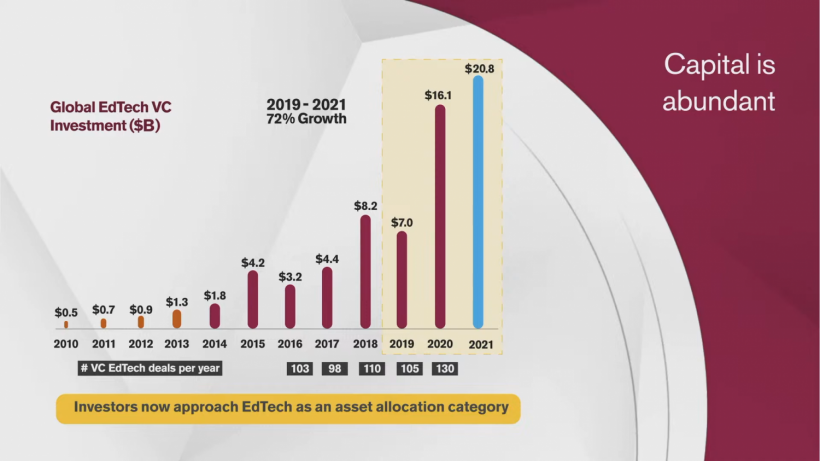At the Waste Management Phoenix Open in Arizona, the blink-and-you'll-miss-it-event kicked off with an exciting discussion between University of Arizona President Dr. Robert Robbins and well-known tech entrepreneur Peter Thiel. This barely 30-minute conversation is only a mere minuscule purview into how Arizona itself is focusing largely on how better to bring about innovation through state adoration.
Thiel adds weight, both literal and figurative, to the cryptocurrency equation, spelling out where he finds the digital monopoly best resides:
"There's sort of, in one sense, you can say Bitcoin is a new and improved version of gold. The total market cap of Bitcoin's about $650-$750 billion; the total amount of gold in the world is about $8 trillion and that sort of suggests that there can be sort of one big additional leg, just as Bitcoin becomes gold and, probably, in a world where bonds are bad, and stocks are bad, and cash is just trash, you know you probably want to have real assets. Gold will probably do well, Bitcoin will do even better."
Various other speakers throughout the event seemingly pride themselves on their Arizona upbringing and how technology itself is fueling the drive for progress in the state. From fintech to edtech, said areas are only enhancing the ways Arizona can better situate itself in a largely San Francisco and New York-run industry.
Among the many speakers was Samantha Bradley, whose efforts with RealmSpark ASU prove that both technological innovation and higher education can work together to bridge better learning systems to students at all knowledge levels. As managing director at RealmSpark, Bradley assists in defining the best areas of "utilizing technology and investment into early stage companies to approach" higher education.
It may sound like a bunch of jargon and big words put together, but RealmSpark is a treat for those young adults with all but a pinky toe in the water when it comes to approaching college. As only one of the many ways RealmSpark assists in leveraging tech, specifically data in this case, for better educational practices, the company sends out letters to college qualifying high school students who have yet to apply, as well as "high school students who are a few credits shy," ensuring every base is covered.

Related Article: Capacity Gets EdTech Breakthrough Recognition for its AI Helpdesk in Universities
This data-driven and bolstering educational initiative has, in its first year of existence, led to 72% of said recipients registering to ASU. It's proof enough that big data and commitment to learning can only expound upon high educational needs, as even for myself, receiving such a letter would have had astronomical differences on how I went about managing my college career.
It's ironic, given that Thiel himself had discussed the growing pains of reworking higher education in the context of technology only mere minutes prior. Here stands Bradley, who convincingly relays that "the most successful educational systems in the world - they know that they are human systems." Her presentation thus underscores the Five Realms of Teaching and Learning, a spectacular look into how RealmSpark is building out innovations beyond simply the classroom.
The future of education is certainly bright, at least in Arizona for now, but if all goes well, there is no doubt that the concepts and underpinnings will be picked up more broadly. Look no further than Blackboard, which no sooner evolved into a higher educational standard for most schools, especially those solely based online.
Another great area of innovation paved via Arizona itself is enterprise, venture capital, startup enhancements, and entrepreneurship. The panel, headed by Jack Shelby, featured among the most influential names in Arizona-based investing, including Gregg Scoresby, Kyle Brown, and Lucas Haldeman. All, amidst heavy discussion, underscore the value in inspirational technology fueled by broadened investing. Thus, the creation of the StartupAZ Foundation proves of ample importance to not only the state but well beyond.
It's here where Arizona is thriving in driving innovation through what it already well knows: fintech and edtech. With StartupAZ, the fund is built around cherishing Arizona entrepreneurs and assisting in their long-term goals via enhanced business practices and knowledge beyond the investing realm. For Scoresby specifically, it's all about SaaS, or systems as a service, which will be a dominating factor for Arizona startups in his line of sight.
The Converge WMPO 2022 Tech Summit, which was sadly canceled last year due to the still ongoing pandemic, certainly proved a delight in a time wherein metaverse and NFT aspirations have no sooner become a dime a dozen. It was refreshing to see how a mere state is handling technological innovations and how that itself is aiding in promoting Arizona as a newfound Silicon Valley.
The Summit was aptly concluded with a brief talk by none other than Arizona Governor Doug Ducey, who likewise voiced ample praise, glee, and awe at the state's burgeoning stance within the tech industry. Governor Ducey relays:
"Venture capital invested $1.8 billion in Arizona last year, more than two times the year before, and it's not by accident. There's never been a better time to be in the state of Arizona."
Read Also: 5 Fintech Trends That Will Revolutionise Banking and Financial Services for 2022








